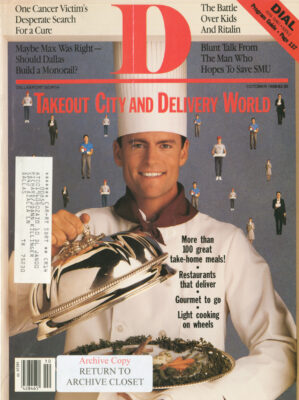EARLY IN THE WEEK FOLLOWING THE foiled DART bond referendum they gathered in a board room to decide what would happen next. Who would run DART now that the voters had had their way with the stumbling transit authority on June 25?
Dave Fox was at that meeting. Fox is a member of SMART, Sensible Metropolitan Area Rapid Transit, the group that worked successfully to defeat the bond referendum. Fox says he was called to the meeting by some members of the Greater Dallas Chamber of Commerce and the Dallas Citizens Council, both of which supported the referendum.
Norman Brinker, the chamber and citi-zens council member who had long asked troubling questions about DART, was also there, along with Jack Harvard of Piano, DART board member and member of the Metroplex Mayors Committee; and Ray Hunt and John Johnson, both of the cham-ber and the citizens council.”Then somebody suggested we ought to get Lee Jackson because he hadn’t been in the fray.” says Fox, So they called Jackson and got him out of a meeting.And so these businessmen began to map out what they hoped was a process that would determine the future of DART. They agreed that a member of the Afro-American community should be on the committee. Someone suggested John Wiley Price. And since Irving was considering pulling out of DART, someone suggested that the mayor of Irving, Bob Pierce, should be included. Before they knew it, they had fourteen people. But without the authority, without any authority really, to appoint such a task force, the hand-picked group was handed to Harvard, who took the names back to his Met-roplex Mayors Committee.
And so it was done. Out of the Metroplex Mayors Committee emerged what we now know as the Mobility Oversight Council.
Without a catchy acronym, like DART or SMART, the group quickly ran into identity problems. Some call it the Greater Dallas Mobility Committee. Others call it the “Jackson task force,” after its chairman, County Judge Lee Jackson. Still others, including former DART board member Dick Smith, call it the “Godfather committee,” in reference to another of its members, State Highway and Public Transportation Commission chairman Robert Dedman Sr., who some see as a Godfather working behind the scenes to eliminate DART and its mass transit mission in order to secure more money for more roads.
The group has had other, more fundamental problems. “Who ordained this group?” new-guard neighborhood activist Cay Kolb predictably asked at one of the first meetings of the Jackson committee. The answer she got, of course, was that the Metroplex mayors group gave this committee the go-ahead. But you could say that this future-of-DART committee was ordained by Dallas’s history, one rich with task forces created behind closed doors. And so they forged ahead in the dog days of summer, these historians, to map out DART’s future.
But before the hand-picked committee could address that future, it had to grapple with the present. The DART board-a bunch of lame ducks, given the devastating loss in the bond election and the fact that all of them would be up for reappointment on September 1-initially resisted the Jackson committee’s input. There was some posturing in the press, with flamboyant quotes flying between Fox, Dedman, and former DART board chairman David McCall of Piano. In one of the more memorable and confusing exchanges, McCall said the Jackson committee, which he somewhat reluctantly sits on, was like “the goose that got the golden egg”-the egg being DART’s 1 percent sales tax, amounting to $163 million a year, a portion of which the committee was considering requesting to fund a study. But, McCall said, the Jackson committee wanted to do away with the goose, meaning DART. Though the analogy doesn’t quite work, imagine McCall saying it with passion, as he did, in the heat of the moment-a 100-degree DART board meeting on July 26.
The next morning, McCall was a little calmer. He apparently had accepted the inevitability of the Jackson committee and even called it “an altruistic move that could be of benefit to DART,” For some, this was the beginning of a feeling of vague optimism, for Dallas and its suburbs had been told that the Jackson committee was going to make sure all of the transportation options were on that expensive DART board room table. And the vague optimism was enhanced because the troops were starting to fall in line. A couple of other committees had stepped forward when DART stumbled in June-the North Central Texas Council of Governments’ Regional Transportation Council, and the Dallas-area Chambers of Commerce Regional Mobility Task Force. But given that the Jackson committee had already been ordained by the business community and baptized by the fire of the DART board meeting, these two groups offered the Jackson committee a non-compete agreement, adding, however, that they will review (and pass judgment upon) the committee’s recommendations. The co-chairman of the chambers’ Regional Mobility Task Force. John Crawford, says he will be active in the meantime, working with DART, serving as a conduit between the business community and DART and other transit entities to get community input for a new regional mobility plan.
So. the Jackson committee began to look at what it might do to map out the future of DART. . .but first it had problems with its size. Though some of its members had often criticized DART for its large, unwieldy twenty-five-member board, Jackson was finding it hard to keep his committee limited to fourteen members. As Dallas and its many suburbs began to recognize the Jackson committee as DART’s absentee landlord, everyone wanted a voice.
While the Jackson committee temporarily floundered about, seeking full representation, attention began to turn to another outside power-the state legislature, the folks who had blown breath into the DART board back in 1983. Maybe they were really the people who “ran DART.” The word was if DART didn’t fix itself, or if the Jackson committee didn’t fix it, then come January, the legislature would.
Early in August, the Dallas delegation in the state legislature met to discuss the DART dilemma. (Not surprisingly, Dave Fox also went to that meeting, though he’s not a legislator.) The members of that delegation disagreed on exactly what DART’s problems were and the particulars of how to fix them, but they all agreed that something must be done with the DART board. In the end, those legislators knew, after the Jackson committee and the chambers’ mobility task force and the council of governments’ regional transportation council and various others all made their recommendations to the DART board-it would still be the DART board that technically ran DART.
Dallas city council member Jerry Bartos knew this, too. So while the Jackson committee was still deciding what to call itself, and while the DART board was inviting community input, he began to work behind the scenes with the other Dallas city council members to get some new faces on the DART board, some people who would be more open-minded, he says, about choices. It’s no coincidence that DART executive director Charles Anderson also began to bring up the subject of transportation choices in August. Anderson himself had already abdicated any power he had wielded at DART, taking a decidedly hands-off stance immediately after the June bond referendum. In August, he tried to make himself look even more powerless by taking a salary cut and by inviting in a group of Dallas executives, Dallas United (which had actually approached him first), to analyze the inner workings of the DART staff. After a polling of the old DART board, the Dallas United probe was politely declined.
So as Dallas heated up once again on the subject of DART, Anderson began to spout the new party line-the one being handed down by the outside powers: flexibility and choice. Maybe DART could use some of its $446,575 a day in sales tax revenue to build a monorail down Central, light rail elsewhere, HOV lanes on LBJ Freeway?
Come September 1, Bartos’s hard work paid off in new faces, new names, and, perhaps, open minds on the DART board. Only five incumbents will return to the Dallas seats on the DART board: Linda Wise, Loretta Phillips, Thomas Taylor, Daryll Coleman, and Jim Buerger. The new faces from Dallas are Peter Baldwin. Elizabeth Ann Flores, Barrett Barker, Jerome Brown, and Larry Williamson. All three of Dallas’s at-large seats were filled by new members: Hispanic leader Adelfa Callejo, Carlos Fonts, and Henry Graeser. In the suburban and county seats, fallout was also expected. When D went to press, the appointments had not been made.
But the legislators are still waiting, holding the power to change the configuration of the DART board and that 1 percent sales tax. If the new DART board doesn’t behave, doesn’t look at those choices, doesn’t exhibit flexibility, the legislature could scramble DART’s golden egg.
“That is really what this is all about,” says state representative Steve Wolens, a Democrat from Oak Cliff, “the money.” Wolens expects the fight for the 1 percent sales tax to heat up in Austin come January.
In the meantime, the interested voters wait … for the DART board to come up with a new service plan (ETA: seven to twelve months); for DART to rebuild its credibility in the community (ETA: six to eight months following some schmoozing with the public via questionnaire); for the Jackson committee to make its recommendations on changes in DART procedure (ETA: soon, very soon).
If this all sounds like a mess to you, you’re not alone. When D went to press, Jackson, the visionary, the straight-shooter who the businessmen were hoping could ride in on a trusty steed and clean all of this up, wasn’t exactly optimistic: “We have met the enemy,” says Jackson, “and he is us.”
Related Articles

Hockey
What We Saw, What It Felt Like: Stars-Golden Knights, Game 1
Deja vu all over again. Kind of.
By Sean Shapiro and David Castillo

Movies
A Rollicking DIFF Preview With James Faust
With more than 140 films to talk about, of course this podcast started with talk about cats and bad backs and Texas Tech.
By Matt Goodman

Business
New CEOs Appointed at Texas Women’s Foundation and Dallas Area Habitat for Humanity
Plus: Former OpTic Gaming CEO Adam Rymer finds new e-sports post, Lynn Pinker Hurst & Schwegmann hires former Mary Kay chief legal officer, and more.
By Celie Price and Layten Praytor


